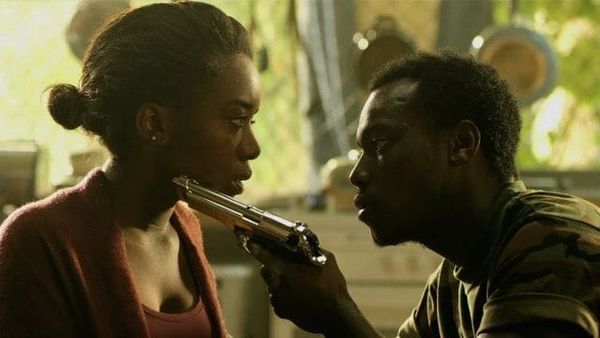Eye For Film >> Movies >> Black (2015) Film Review
Black
Reviewed by: Rebecca Naughten

Adapted from two popular books by Dirk Bracke, Black plots a Romeo and Juliet-style love story against the backdrop of urban gang wars and immigrant communities in contemporary Brussels. In some respects, it is not that different to the dozens of other teen romances that find their way to the screen each year - it follows a certain narrative format - but Adil El Arbi and Bilall Fallah direct with real verve and guide their cast to set about the genre with gusto.
Marwan (Aboubakr Bensaïhi) belongs to the 1080s - a Maghrebi gang headed by Marwan's brother Nassim (Soufiane Chilah), who specialise in street robberies - but his parents and the neighbourhood police officer continually implore him to do something more with his life. Familial strife is also evident between Mavela (Martha Canga Antonio) - a new member of Black Bronx, a violent gang of African origin (Ugandan, if certain background references are pertinent) - and her university-educated mother (who pointedly always calls her daughter by her full given name, Marie-Evelyn). Marwan and Mavela - both first-generation nationals - believe that the colour of their skin holds them back from progressing within Belgian society and argue with their parents that they therefore 'belong' with their respective gangs. The two meet by chance in a police station when they have both been arrested for shoplifting, they hit it off and one thing leads to another...

Their romance jeopardises their standing within their respective gangs - putting Mavela in serious danger - and if this main narrative strand treads a well-worn path, it also highlights some differences between the gangs in terms of how women are treated. The 1080s are sometimes cheerily dismissive of the women in their company, but they don't behave as if they are interchangeable - when Nassim goes to prison early in the film, his main instruction to Marwan is to take care of his girlfriend, Loubna (Sanaa Bourrasse). In contrast, the women in Black Bronx are treated like meat to be shared and casually passed around. The only reason that Mavela has yet to be 'initiated' into this behaviour is because her cousin (Théo Kabeya) is an established member of the gang - she seems oblivious to what is heading her way.
If the sexual violence meted out against the female characters is a realistic element within this milieu, its depiction within the film is nonetheless disturbing. The opening sequence - where we intuit that a woman is being sexually assaulted through the combination of screams and abstract patterns of colour, movement and light seen through textured glass - is a more imaginative representation in comparison to a later assault when a female character is stripped during a gang rape and effectively put on display for the camera as well as for her attackers. It could be argued that this is in keeping with how the men onscreen view her, but it is aggravating to watch women filmed in traumatic situations in such a way as to simultaneously offer titillation for onlookers (onscreen or off).
That issue aside, this energetic film has a lot to recommend it, not least the way music is juxtaposed with action. The standout sequence in this respect is the montage of Mavela's downward spiral after she's forcibly separated from any outside support and she is shown adrift and under the control of Black Bronx, which is set to the sound of a cover version of Amy Winehouse's Back to Black (here performed as a duet by Oscar and the Wolf feat. Tsar). The film's other main assets are its two extremely charismatic leads, all the more impressive given that the cast is made up of non-professionals and this is their first acting credit. They - and the directors - are names to watch out for in the future.
Reviewed on: 13 Dec 2015

















